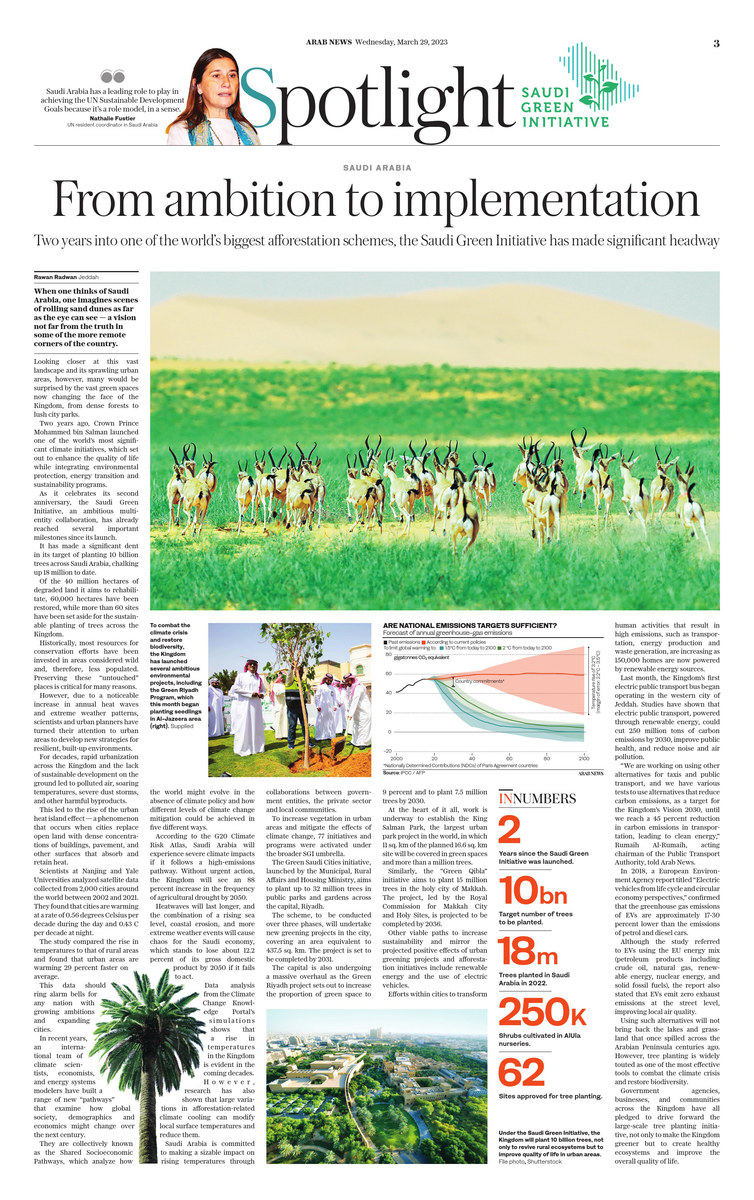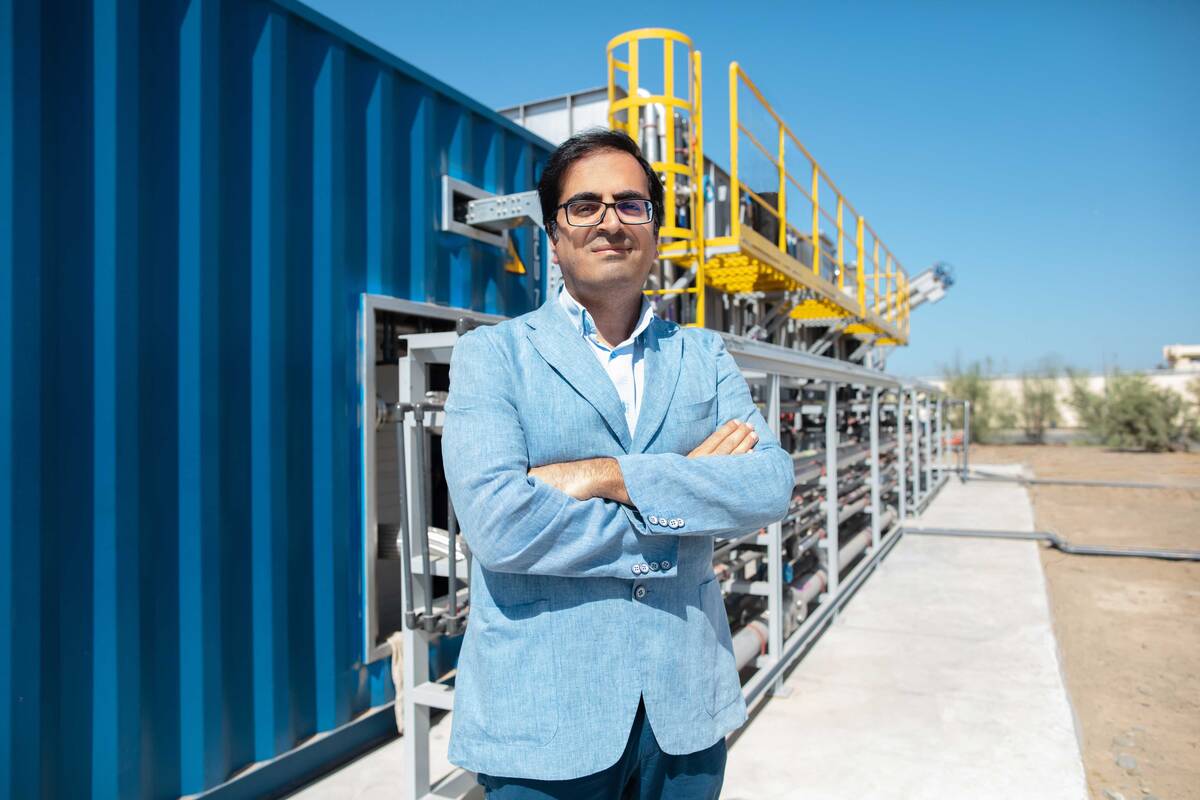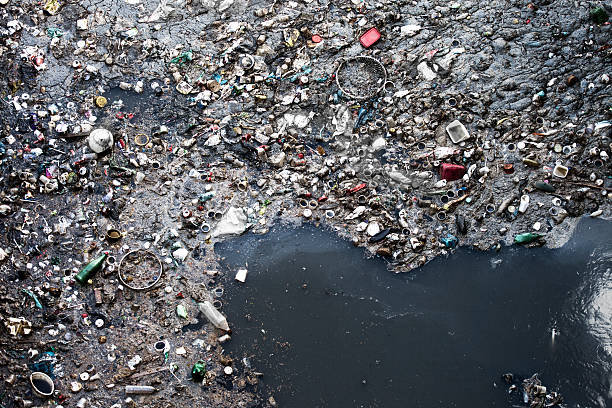JEDDAH: When one thinks of Saudi Arabia, one imagines scenes of rolling sand dunes as far as the eye can see — a vision not far from the truth in some of the more remote corners of the peninsula.
Looking closer at this vast landscape and its sprawling urban areas, however, many would be surprised by the vast green spaces now changing the face of the Kingdom, from dense forests to lush city parks.
Two years ago, Crown Prince Mohammed bin Salman launched one of the world’s most significant climate initiatives, which set out to enhance the quality of life while integrating environmental protection, energy transition and sustainability programs.

Green cover of Riyadh. (RCRC)
Celebrating its second anniversary, the Saudi Green Initiative, an ambitious multi-entity collaboration, has already reached several important milestones since its launch.
It has made a significant dent in its target of planting 10 billion trees across Saudi Arabia, chalking up 18 million to date.
Of the 40 million hectares of degraded land it aims to rehabilitate, 60,000 hectares have been restored, while more than 60 sites have been set aside for the sustainable planting of trees across the Kingdom.
INNUMBERS
- 2 Years since Saudi Green Initiative was launched.
- 10 billion Target number of trees to be planted.
- 18 million Trees planted in Saudi Arabia in 2022.
- 60,000 Hectares of land rehabilitated in 2022.
- 250,000 Cultivated shrubs in AlUla nurseries.
- 62 Sites approved for tree planting.
- 150,000 Homes powered by renewable energy.
- 1,200 Endangered animals rewilded.
Historically, most resources for conservation efforts have been invested in areas considered wild and, therefore, less populated. Preserving these “untouched” places is critical for many reasons.
However, due to a noticeable increase in annual heat waves and extreme weather patterns, scientists and urban planners have turned their focus on urban areas to develop new strategies for resilient built environments.
For decades, rapid urbanization across the Kingdom and the lack of sustainable development on the ground led to polluted air, soaring temperatures, severe dust storms, and other harmful byproducts.
Saudi Green Initiative: An overview
There is a mechanism for defining specific places for afforestation and selecting suitable species for cultivation. Experts and specialists supervise the selection of planting sites before implementing, where available space and assured protection of the sites are mandatory to ensure the preservation and maintenance of trees. This is in addition to the suitability of the trees planted in these sites, whose types are chosen to make them compatible with the type of the soil in which they are planted. The National Center for Vegetation Coverage Development and Desertification Control has selected about 26 sites in various regions of the Kingdom to serve as alternative sites if the partner agencies do not have sites to implement afforestation campaigns. These sites meet all the requirements, including for protection and care.
The Environmental Awareness Initiative is one of the many efforts of the National Transformation Program to enhance and raise societal awareness of environmental issues and establish a sense of individual and collective responsibility for preserving natural resources in the Kingdom. The initiative aims to contribute to reducing pollution of all kinds and achieving environmental sustainability. This is being achieved through afforestation campaigns and directing the efforts of agencies, institutions and individuals toward afforestation. Afforestation campaigns are being launched with the private sector or environmental associations in coordination with the National Center for Plant Cover Development and Combating Desertification. The “Let’s Make It Green” campaign aims to increase the green area in the Kingdom and combat desertification, in addition to rehabilitating degraded vegetation sites and raising awareness of the importance of reducing harmful vegetation practices. The objective is to improve the quality of life in Saudi Arabia per the goals of Vision 2030.
- Saleh Bindakhil, spokesman for Saudi Arabia’s Ministry of Environment, Water and Agriculture.
This led to the rise of the urban heat island effect — a phenomenon that occurs when cities replace land with dense concentrations of buildings, pavement, and other surfaces that absorb and retain heat.
Scientists at Nanjing and Yale Universities analyzed satellite data from across 2,000 cities around the world from 2002 to 2021. They found that cities are warming by a rate of 0.56 degrees Celsius per decade during the day and 0.43 C per decade at night.
The study compared the rise in temperatures to that of rural areas and found that urban areas are warming 29 percent faster on average.
This data should ring alarm bells for any nation with growing ambitions and growing cities.
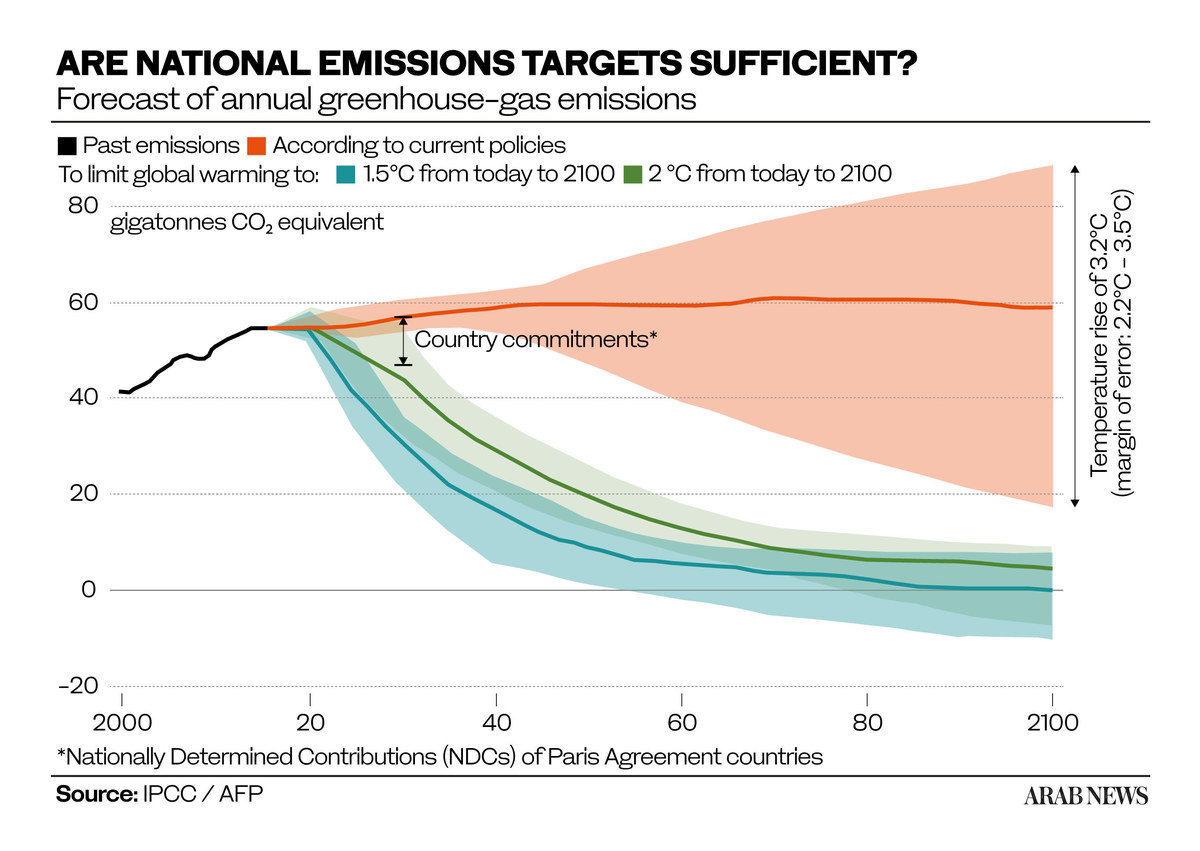
In recent years, an international team of climate scientists, economists, and energy systems modelers have built a range of new “pathways” that examine how global society, demographics, and economics might change over the next century.
They are collectively known as the Shared Socioeconomic Pathways, which analyze how the world might evolve in the absence of climate policy and how different levels of climate change mitigation could be achieved in five different ways.
According to the G20 Climate Risk Atlas, Saudi Arabia will experience severe climate impacts if it follows a high-emissions pathway. Without urgent action, the Kingdom will see an 88 percent increase in the frequency of agricultural drought by 2050.
Heatwaves will last longer, and the combination of sea level rise, coastal erosion, and more extreme weather events will cause chaos for Saudi Arabia’s economy, which stands to lose around 12.2 percent of its gross domestic product by 2050 if it fails to act.
Data analysis from the Climate Change Knowledge Portal’s simulations shows that a rise in temperatures in the Kingdom is evident in the coming decades.
However, research has also shown that large variations in afforestation-related climate cooling can modify local surface temperatures and reduce them.
Saudi Arabia is committed to making a sizable impact on rising temperatures through collaborations between government entities, the private sector, and local communities.
TIMELINE
- 2016 King Salman launches renewable energy initiative.
- 2017 National Renewable Energy Program announced.
- 2018 Launch of the National Environment Strategy.
- 2019 Creation of the Special Forces for Environmental Security.
- 2020 “Let’s Make it Green” campaign launched to halt desertification.
- 2021 Inaugural Saudi Green Initiative Forum and Middle East Green Summit.
- 2030 Target to plant +600 million trees, protect 30 percent of land and sea, cut CO2 emissions by 278 million tons per annum.
- 2060 Target to achieve net-zero carbon emissions.
To increase vegetation in urban areas and mitigate the effects of climate change, 77 initiatives and programs were activated under the broader SGI umbrella.
The Green Saudi Cities initiative, launched by the Municipal, Rural Affairs, and Housing Ministry, aims to plant up to 32 million trees in public parks and gardens across the capital city, Riyadh.
The scheme will be conducted over three phases and will undertake new greening projects in Riyadh, equivalent to an area of 437.5 sq. km. The project is set to be completed by 2031.
The capital is also undergoing a massive overhaul as the Green Riyadh project sets out to increase the proportion of green space to 9 percent and to plant 7.5 million trees by 2030.
At the heart of it all, work is underway to establish the King Salman Park, the largest urban park project in the world, in which 11 sq. km of its planned 16.6 sq. km park will be covered in green spaces and more than a million trees.
Similarly, the “Green Qibla” initiative aims to plant 15 million trees in the holy city of Makkah. The project, led by the Royal Commission for Makkah City and Holy Sites, is projected to finish by 2036.
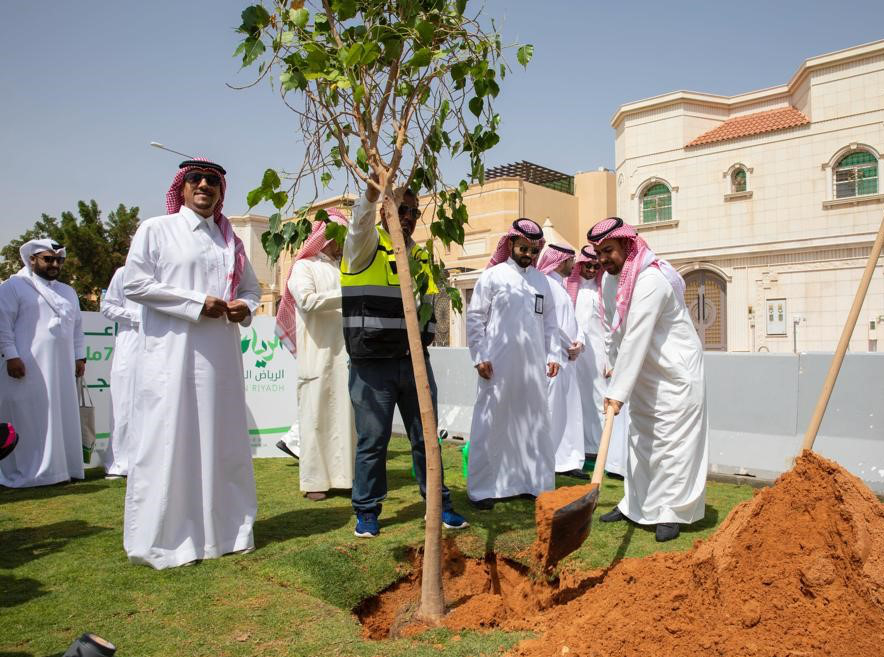
Abdulaziz Al-Moqbel, Director of the Green Riyadh Program, participating in planting the first seedlings in the afforestation project in Al-Jazeera neighborhood (east of Riyadh) on Thursday, March 16, within the activities of “Green Riyadh” program. (Supplied)
Other viable paths to increase sustainability and mirror the projected positive effects of urban greening projects and afforestation initiatives are renewable energy and the use of electric vehicles.
Efforts within cities to transform high-emissions human activities such as transportation, energy production, and waste generation are increasing as 150,000 homes are now powered by renewable energy sources.
Last month, the Kingdom’s first electric public transport bus began operating in the western city of Jeddah. Studies have shown that electric public transport, powered through renewable energy, could cut 250 million tons of carbon emissions by 2030, improve public health, and reduce noise and air pollution.
“We are working on using other alternatives for taxis and public transport, and we have various tests to use alternatives that reduce carbon emissions, as a target for the Kingdom’s Vision 2030, until we reach a 45 percent reduction in carbon emissions in transportation, leading to clean energy,” Rumaih Al-Rumaih, acting chairman of the Public Transport Authority, told Arab News.
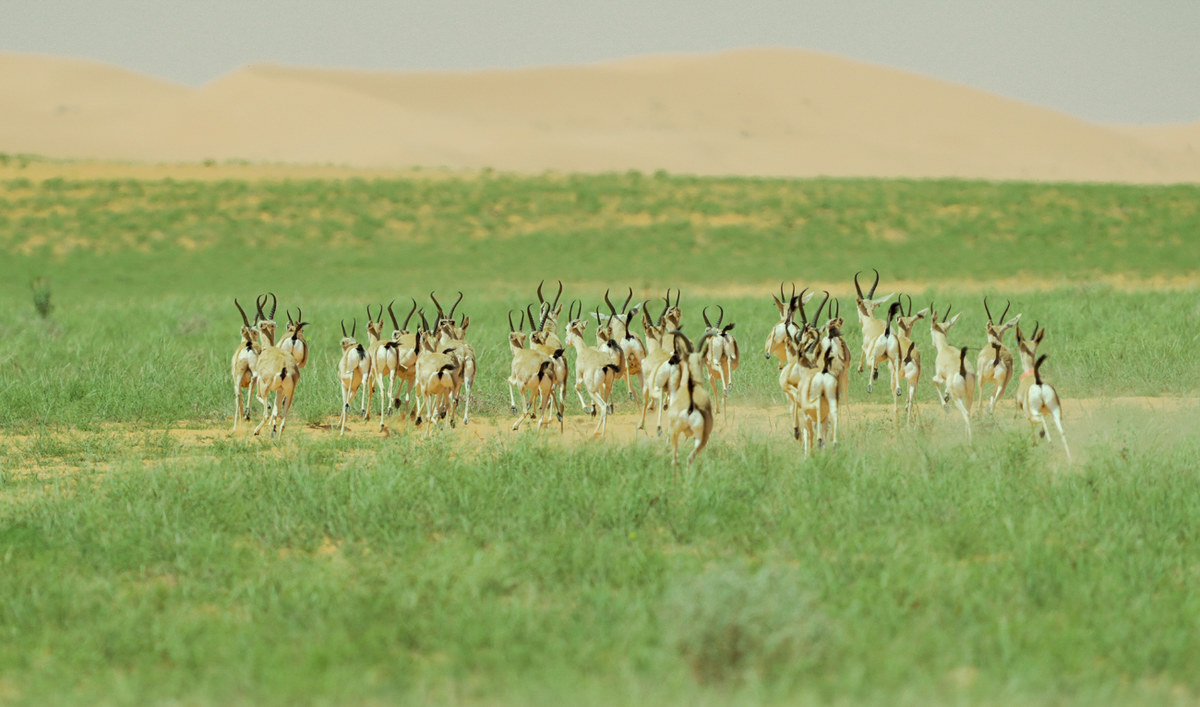
Environmental and wildlife conservation go hand in hand in changing Saudi Arabia. (NCW)
In 2018, a European Environment Agency report titled “Electric vehicles from life cycle and circular economy perspectives,” confirmed that the greenhouse gas emissions of EVs are approximately 17-30 percent lower than the emissions of petrol and diesel cars.
Although the study referred to EVs using the EU energy mix (petroleum products including crude oil, natural gas, renewable energy, nuclear energy, and solid fossil fuels), the report also stated that EVs emit zero exhaust emissions at the street level, improving local air quality.
Using such alternatives will not bring back the lakes and grassland that once spilled across the Arabian Peninsula centuries ago. However, tree planting is widely touted as one of the most effective tools to combat the climate crisis and restore biodiversity.
Government agencies, businesses, and communities across the Kingdom have all pledged to drive forward the large-scale tree planting initiative, not only to make the Kingdom greener but to create healthy ecosystems and improve the overall quality of life.
